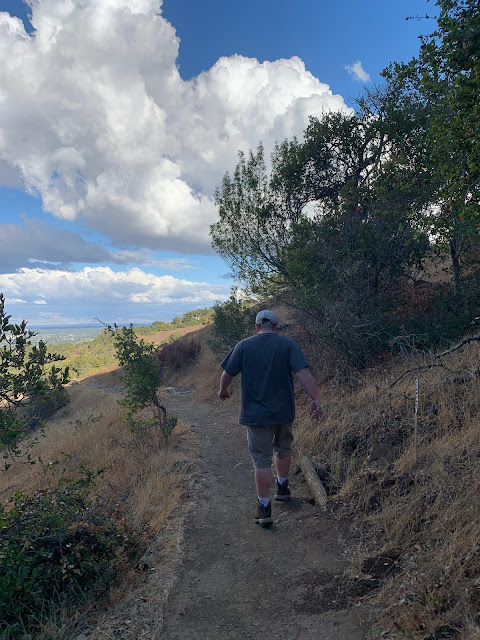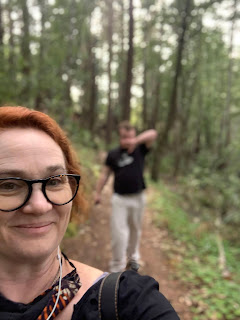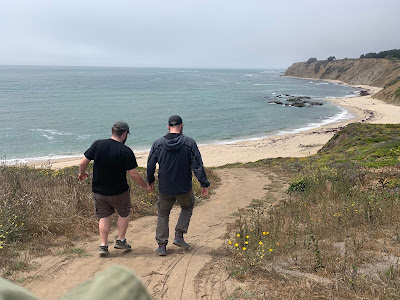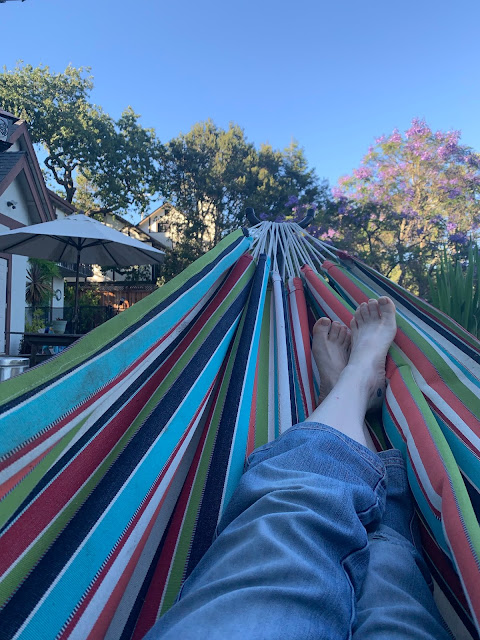I’m pleased that April has been reclaimed as Autism Acceptance Month, after years of superficial “awareness” campaigns. Even the White House made an autism acceptance proclamation this year! And yet, we are still only inching towards real world autism understanding. Or so I observed recently at a cast and crew screening of the autism-centric movie Ezra.
Please know: Ezra is a beautifully directed and acted film, with witty, wry dialogue and many of my favorite players—including Matilda Lawler from Station Eleven, Whoopi Goldberg who played Guinan in Star Trek: TNG, and Rainn Wilson AKA Harry Mudd in Star Trek: Discovery.
And it was clear from the post-film Q & A that the team behind the film was 100% committed to the mission as they understood it: Writer Tony Spiridakis has an autistic son; director Tony Goldwyn is the writer’s longtime BFF and made the movie happen; Robert De Niro, who played Ezra’s grandfather Stan, has an autistic son; and William Fitzgerald, the remarkable debut actor who played Ezra, is actually autistic. Bobby Cannavale, who plays Ezra's dad Max, got visibly emotional while discussing what his role meant to him. Plus Associate producer Alex Plank, who is autistic and who was not at the screening, oversaw on-set sensory accessibility.
There was also obvious affection between the cast and crew at the Q & A, especially between Fitzgerald and De Niro, with the younger actor roasting the older, and De Niro fondly reaching over to pat William’s hand (and knowing that doing so would be OK). Though De Niro declined to go into much detail about his own experience as a parent, which I respect for his son’s sake.
That personal and emotional investment makes it even more painful that the movie stumbles on autism and disability acceptance messaging, and mostly employs a non-autistic lens. Though Ezra's parents obviously love him to bits, they don't really understand him. They are fine with him wearing a dinosaur costume outside the house, and his mom ensures he has plastic cutlery due to sensory sensitivity, yet Ezra’s boundaries are constantly ignored or ridden over—as with his dad forcing him to eat with a metal fork, or trying repeatedly to hug Ezra despite being rebuffed every time. The final scene of Ezra embracing his dad during a crisis seems like pure non-autistic parent wish fulfillment.
Since the movie was written by a father of an autistic son, it tracks that the movie’s focus is less Ezra than on how his dad's life is affected by having an autistic kid. Max keeps Ezra out inappropriately late at his stand-up comedy gigs in part because he sees his son as a good luck charm. In the movie’s pivotal plot point, Max kidnaps Ezra and takes him on a cross-country road trip to a Jimmy Kimmel Show booking—because Max thinks only he knows what Ezra needs following a series of school and medical crises. This despite Ezra’s mother and Max's ex-wife Jenna (played by Rose Byrne, Cannavale’s real-life spouse) being a loving and attentive primary caregiver, as well as the only person who accommodates and reciprocates affection with Ezra on his own autistic terms.
The most disappointing part of Ezra is its disrespect towards students with higher support needs. When Ezra is expelled from his Hoboken school for leading a Breaking Bad-inspired student rebellion, it is strongly suggested that he go to a “special needs” school instead. But when he and his parents visit that school, we are shown developmentally disabled children—many of color—as evidence that Ezra obviously doesn’t belong there. As the parent of a high-support autistic son and a human, I find using people like my own son as a scare tactic deeply offensive, and I am disheartened that Ezra’s creative team is reinforcing such prejudices. All autistic and disabled students deserve our respect, as well as appropriate and personalized placements. Including Ezra. Including my son.
The movie also bungles the medication discussion. While it is undeniable that medication for autistic and disabled people can get used to sedate rather help, it is also true that meds are a crucial coping tool for autistic people whose neurology and wiring is not calibrated to tolerate a hostile world and society. Not every autistic person needs medication, but we already have too many parents refusing to “put their kids on drugs” that could help those autistic kids be less anxious and better regulated. Many of these parents see medication as a cop-out, and believe their autistic kids should learn to “deal” instead—a cruel and misinformed take that Ezra unfortunately reinforces. Plus having Max exclaim that he won’t put his kid on a medication for the “clinically insane” is ignorant at best. (I attended the screening with two neurodivergent Gen Z adults, so as to get their takes. After this and the “special needs” school scenes, one of them, who is a moderate support needs autistic, walked out.)
It is not insignificant that the movie implies both Max, Ezra’s father and Stan, his grandfather, have autistic traits. Unfortunately this is portrayed as why both men are divorced, which is kind of the opposite of an autism understanding and acceptance message. But it’s nice to see an acknowledgment of what research has been reinforcing for years—most autism is inherited. There was also not a drop of autism causation nonsense, which was a relief, especially as De Niro has a history of endorsing antivax autism causation pseudoscience (though after seeing him thoughtfully discuss autism and interact with an autistic child IRL, I have to wonder if that advocacy grew from love for his own child combined with misinformation, as I’ve been there myself).
Ezra was made by truly well-meaning folks sincerely trying to make a difference for autistic people. The problem is, they don’t grasp what autism acceptance means from the inside. And even though autistic producer Alex Plank was onboard to advise and guide, my guess is that there was only so much he could do on a movie whose primary creative team lacked lived autistic experience.
If I wasn’t personally and professionally involved in autism and neurodiversity advocacy, I would probably cheer Ezra on. Aside from its autism messaging, it is sweet and delightfully offbeat, and Fitzgerald is phenomenal in the title role. But I owe it to my own son and his autistic community to note that Ezra doesn't qualify as an autism acceptance film due of its running theme that autistic people need to play by non-autistic rules. I would love to see an autism movie that features non-autistics learning to adapt our behavior and expectations to accommodate their needs and come into the autistic world. I would love to see a great kid like Ezra being celebrated and cherished for being himself, not despite what being autistic means for his family.
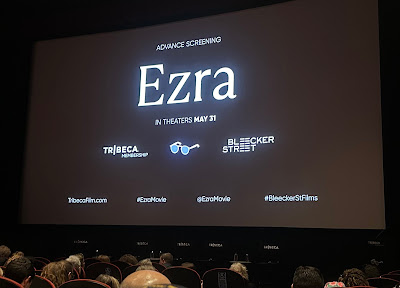 |
| Promo screen for the movie Ezra at the SVA movie theater. |


